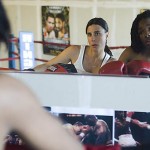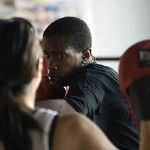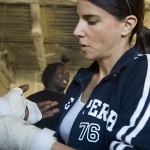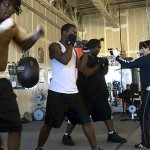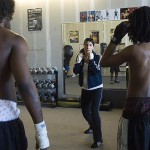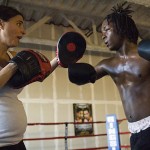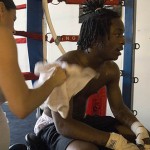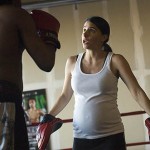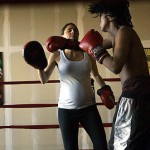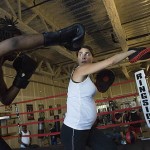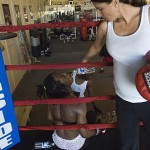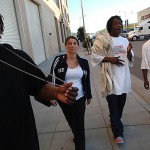Slipping the Punch
Social worker first and boxing trainer second, Whitney Wright ’90 helps at-risk youth face the world in a boxer’s stance
By H. Jay Burns
Punished for talking back to his teacher, one of Whitney Wright’s teenage boxers almost missed his after-school training session.
Later, in a group discussion with Wright and his fellow boxers, he insisted that the teacher was playing him, trying to get him in trouble. But the others confronted him. “You were all offense and no defense,” said one. “You got hit ’cause you went in straight. Slip under the punch, man, re member?”
The boys’ use of a boxing metaphor to deal with a real-world problem was a small victory for Wright, whose program combines boxing training and social group work.
“Boxing is rich in metaphor, and metaphor helps them be insightful about life,” says Wright.
Though her own boxing credentials include the flyweight title in the 2002 San Francisco Golden Gloves, Wright is first of all a clinical social worker. She has spent most of her working life — aside from time off after the birth of her son Rex, 35 days after this March 2007 photo session — working with at-risk teens and young adults. These days she’s in the Bayview Hunters Point neighborhood of San Francisco as director of behavioral health for the Third Street Youth Center and Clinic.
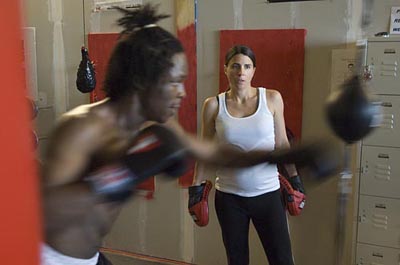
At the Straight Forward Club boxing gym, Whitney Wright '90 — at the time eight months pregnant — focuses her attention on Twan, age 17. He works the double-end bag, used for target practice. Photograph by Victor Blue.
She began boxing in the 1990s, when she and her husband, Thomas Goetz ’90, lived in Brooklyn. “I’d spent a lot of time traveling alone, in Latin America and Europe, and was always very confident,” she says. Then an act of violence struck her family, leaving her feeling vulnerable. “I looked into self-defense classes, but they seemed to be more about walking with confidence and things like that. I wanted something more dynamic.”
Her search ended just down the street from her home, at Brooklyn’s famed Gleason’s Gym, training grounds for Muhammad Ali and Rocky Graziano, among many others. It’s where Robert De Niro became Jake LaMotta for Raging Bull, and where Whitney Wright became a boxer, thanks to trainer Stuart Bakal. “I’d never had a trainer-trainee sports relationship,” she says. “He and I just clicked.”
| Whitney Wright ’90 is director of behavioral health for the Third Street Youth Center and Clinic. The mission of the community-based agency is to “provide youth in Bayview Hunters Point with medical and behavioral health services that encourage them to make decisions that support their health, safety and development.” |
Wright’s relationship with Bakal mirrors her own relationship with at-risk youth. “It was so obvious that boxing lent itself to my work,” she says. “The focus is on building on personal strengths, and I do with my kids what Stu did with me. If they’ve had a hard round, I hug them. I give them water when they’re sparring. And if I’m with them in the ring and they look at something going in the ring, I’ll hit them in the face. I’m going to challenge them.”
Her occasional face swats notwithstanding, Wright argues that boxing is not about violence. “Boxing is about engaging with the other person in the ring and not hiding. Violence means you are not engaging. You’re driving by and shooting someone.”
In the amateur ring, she says, boxers respect and identify with their opponent. “Again, that is the opposite of violence. If you identify with the person you’re inflicting violence on, you’re probably not going to inflict the violence.”
Like a one-two combination, the boxers in Wright’s group learn to respect each other, fostering a sense of mutual aid, a social-work term implying how a group becomes a team. Talking about life and about boxing in group discussion sessions, “they get a cognitive understanding of their experience in the ring,” Wright says. The team members learn to give help and take help, and start to recast their self-identities. That’s not a small matter in a neighborhood where getting shot is a typical way to bolster one’s self-image — “to show, like, ‘I’m really from Hunters Point,’” as one of her boxers said.
“Self-identity is the guiding factor in youth behavior,” says Wright, who outlined 10 positive attributes of her boxing program in “Keep It in the Ring,” published in the academic journal Social Work with Groups in 2006. “There are myriad reasons at play when teens shoot each other, but a healthy self-concept is not one of them.”
Rather than any of the many Hollywood boxing films, Wright’s favorite boxing movie is the documentary On the Ropes. Likewise, she has no Hollywood ending for her story.
“I wish I could say that everyone graduates from high school and becomes a productive member of society. But it’s not the case,” she says. “But I believe in long-term work. I’m still in contact with kids from New York, and I know boxing has played a part in their lives.
“As their coach, counselor, friend, I care what happens to them. I am experiencing all of this with them.”
